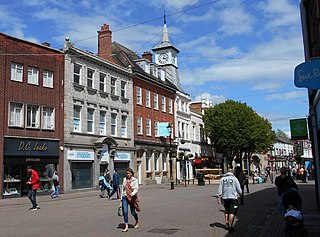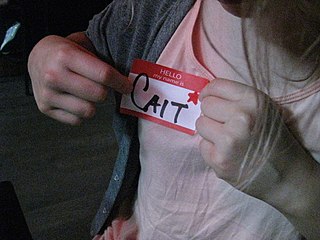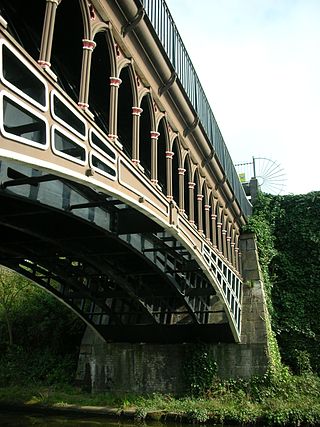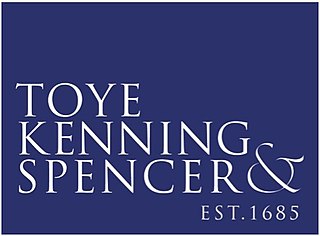
Weaving is a method of textile production in which two distinct sets of yarns or threads are interlaced at right angles to form a fabric or cloth. Other methods are knitting, crocheting, felting, and braiding or plaiting. The longitudinal threads are called the warp and the lateral threads are the weft, woof, or filling. The method in which these threads are interwoven affects the characteristics of the cloth. Cloth is usually woven on a loom, a device that holds the warp threads in place while filling threads are woven through them. A fabric band that meets this definition of cloth can also be made using other methods, including tablet weaving, back strap loom, or other techniques that can be done without looms.

Nuneaton is a market town in Warwickshire, England, close to the county border with Leicestershire to the north-east. Nuneaton's population at the 2021 census was 88,813, making it the largest town in Warwickshire. Nuneaton's urban area, which also includes the large villages of Bulkington and Hartshill, had a population of 99,372 at the 2021 census.

Coventry, a city in the West Midlands, England, grew to become one of the most important cities in England during the Middle Ages due to its booming cloth and textiles trade. The city was noted for its part in the English Civil War, and later became an important industrial city during the 19th and 20th centuries, becoming the centre of the British bicycle and later motor industry. The devastating Blitz in 1940 destroyed much of the city centre, and saw its rebuilding during the 1950s and 60s. The motor industry slumped during the 1970s and 80s, and Coventry saw high unemployment. However, in the new millennium the city, along with many others saw significant urban renaissance and in 2017 it was announced that the city had been awarded the title of 2021 UK City of Culture.

Harris tweed is a tweed cloth that is handwoven by islanders at their homes in the Outer Hebrides of Scotland, finished in the Outer Hebrides, and made from pure virgin wool dyed and spun in the Outer Hebrides. This definition, quality standards and protection of the Harris tweed name are enshrined in the Harris Tweed Act 1993.
Arcadia Group Ltd was a British multinational retailing company headquartered in London, England. It was best known for being the previous parent company of British Home Stores (BHS), Burton, Dorothy Perkins, Debenhams, Evans, Miss Selfridge, Topman, Topshop, Wallis and Warehouse. At its peak, the group had more than 2,500 outlets in the UK and concessions in UK department stores and several hundred franchises operated internationally.

Herbert Art Gallery & Museum is a museum, art gallery, records archive, learning centre, media studio and creative arts facility on Jordan Well, Coventry, England.

Foleshill is a suburb in the north of Coventry, in the county of the West Midlands, England. Longford, Courthouse Green and Rowley Green are to its north and Keresley is to its west. The population of the Ward at the 2021 census was 22,478.

Grosgrain is a type of fabric or ribbon defined by the fact that its weft is heavier than its warp, creating prominent transverse ribs. Grosgrain is a plain weave corded fabric, with heavier cords than poplin but lighter than faille, and is known for being a firm, close-woven, fine-corded fabric. Grosgrain has a dull appearance, with little luster in comparison to many fabric weaves, such as satin, often used for ribbons; however, it is comparatively very strong. Grosgrain fabric is most commonly available in black, but grosgrain ribbon comes in a large variety of colors and patterns. The ribbon is very similar to Petersham ribbon in its appearance, but it does not have the ability to follow the curves of a surface or edge the way that the latter does.

A name tag or name badge is a badge or sticker worn on the outermost clothing as a means of displaying the wearer's name for others to view.

The Horseley Ironworks was a major ironworks in the Tipton area in the county of Staffordshire, now the West Midlands, England.

Charles Bray was a prosperous British ribbon manufacturer, social reformer, philanthropist, philosopher, and phrenologist.

Toye, Kenning & Spencer is a British jewellery and clothing manufacturer based at Bedworth, Warwickshire; the Jewellery Quarter, Birmingham; and Covent Garden, London.

The Arbury Canals were a system of private canals, in the Arbury Estate, between Nuneaton and Bedworth in Warwickshire, England. They connected with the Coventry Canal. They were built by Sir Roger Newdigate between 1764 and 1795, and ceased to be used soon after his death in 1806. The Griff Hollows Canal was separate to the main system, and carried coal until its closure in 1961.
In Pakistan, cottage or household industries hold an important position in rural set-up. Most villages are self-sufficient in the basic necessities of life. They have their own carpenters, cobblers, potters, craftsmen and cotton weavers. Many families depend on cottage industries for income.

Stevengraphs are pictures woven from silk, originally created by Thomas Stevens in the 19th century. They were popular collectable items again during the revival of interest in Victoriana in the 1960s and 1970s.
J. & N. Philips and Company was a business established in 1747 by members of the Philips family, and which ceased trading in 1970. Originally based in Tean, Staffordshire, England, the business was a manufacturer of textile products that expanded both by organic growth and by taking over other businesses involved in the manufacture and merchanting of textile products and smallware. It formed a part of a network of companies operated by the family, whose business interests came to include manufacture of hats and textiles such as linen smallwares, silks and fustians, as well as cotton spinning and dealing, power loom weaving, export merchanting and general warehousing. The family made the majority of its wealth from their involvement in the trans-Atlantic Slave Trade. The family was also involved in politics, with George Philips, Mark Philips and Robert Needham Philips all being Members of Parliament and all promoting the ideals of Manchesterism while in office. George's son, George Richard Philips, was also a member of the House of Commons.
A topshop or top-shop is a design of building specific to Coventry, Bedworth and Nuneaton in the English Midlands, of the 18th and 19th and early 20th centuries. A topshop has three storeys. It is unusual in that the lower two floors are living accommodation, and that the top floor is a workshop containing a weaver's loom. The windows on the top floor are larger than those on the lower two, to let in more light.
Coventry UK City of Culture 2021 is a designation given to the city of Coventry, England, between 2021 and 2025 by the Department for Digital, Culture, Media and Sport (DCMS). The designation means that Coventry gains access to funding to improve its infrastructure and arts facilities, and will host a series of events celebrating local culture. Coventry was selected in 2017 to become the third UK City of Culture since the initiative began in 2013.

Niwar is a coarse, narrow, thick tape that was initially made of cotton only. Niwar is a textile product produced on tape looms and classified as a narrow-width fabric. Baden Henry Powell referred to it as "broad coarse tape", a product of the jail industry. In his book Handbook of the Manufactures and Arts of the Punjab, Powell classified niwar under the category of "tape, string, and miscellaneous cotton products". A weaver of this tape is called a niwar-baf.






















